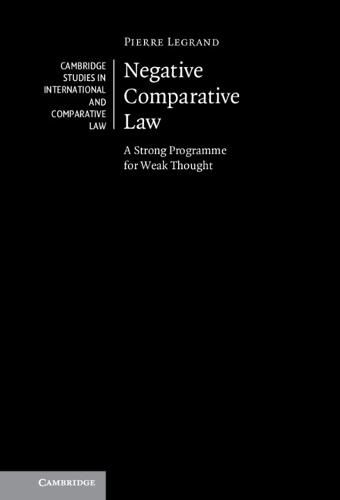Readings Newsletter
Become a Readings Member to make your shopping experience even easier.
Sign in or sign up for free!
You’re not far away from qualifying for FREE standard shipping within Australia
You’ve qualified for FREE standard shipping within Australia
The cart is loading…






Written under the sign of Beckett, this book addresses comparative law’s commitment to the deterritorialization of the legal and its attendant claim for the normative relevance of foreign law locally in the fabrication of statutory determinations, judicial opinions, or academic reflections. Wanting to withstand the law’s persistent tendency towards nationalist retrenchment and counter comparative law’s institutional marginalization, the fifteen essays at hand impart radical and discerning intellectual equipment in order to foster the valorization of the legally foreign and the comparative motion. In particular, the critique informing this manifesto examines pre-eminent topics like culture and difference, understanding and translatability, objectivity and truth, invention and tracing. Harnessing insights from a range of disciplinary discourses, this book contends that comparatists must boldly desist from their field’s dominant epistemology and embrace a practice much better attuned to the study of foreignness.
$9.00 standard shipping within Australia
FREE standard shipping within Australia for orders over $100.00
Express & International shipping calculated at checkout
Written under the sign of Beckett, this book addresses comparative law’s commitment to the deterritorialization of the legal and its attendant claim for the normative relevance of foreign law locally in the fabrication of statutory determinations, judicial opinions, or academic reflections. Wanting to withstand the law’s persistent tendency towards nationalist retrenchment and counter comparative law’s institutional marginalization, the fifteen essays at hand impart radical and discerning intellectual equipment in order to foster the valorization of the legally foreign and the comparative motion. In particular, the critique informing this manifesto examines pre-eminent topics like culture and difference, understanding and translatability, objectivity and truth, invention and tracing. Harnessing insights from a range of disciplinary discourses, this book contends that comparatists must boldly desist from their field’s dominant epistemology and embrace a practice much better attuned to the study of foreignness.